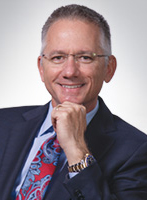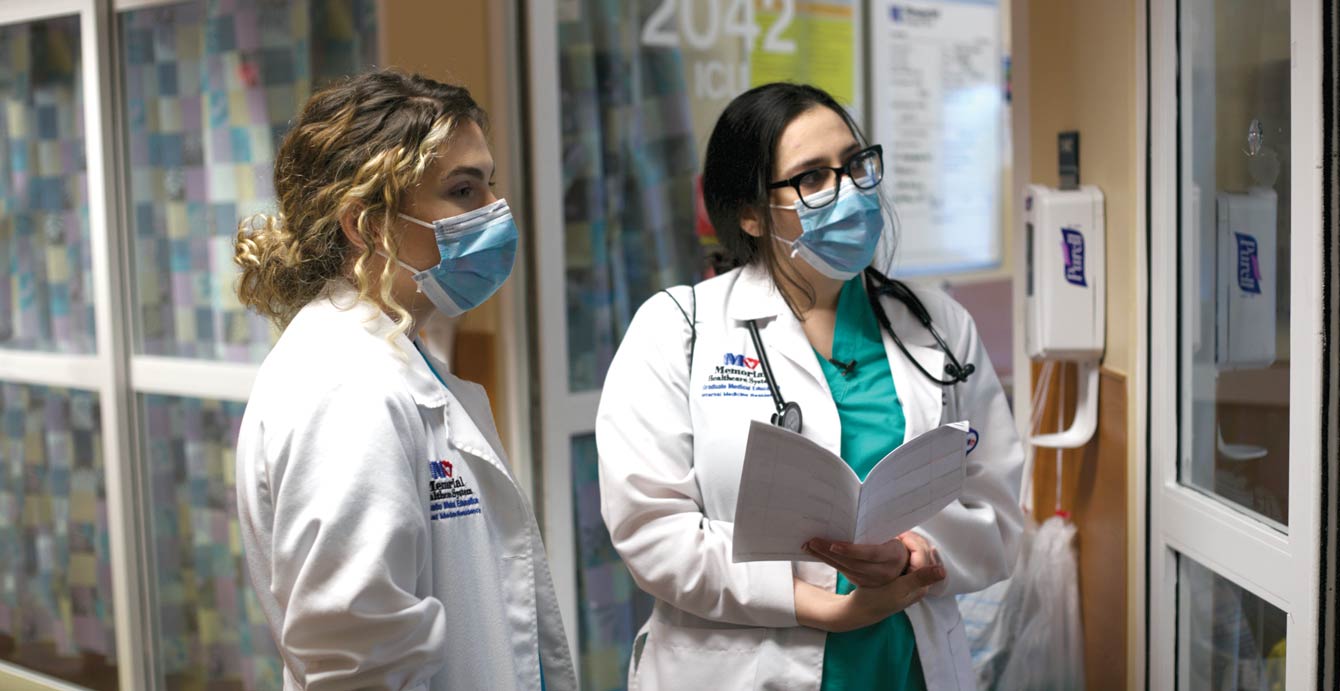
MEMORIAL ADVANCEMENTS
Critical Technology Support for Population Health and Value-Based Care
Population Health
pop·u·la·tion health (noun)
- The health of all people living in a given place, and the differences in health between groups in that place, such as between the wealthy and the poor
- Improved outcomes from preventive primary care and successful disease management
Value-Based Care
val·ue·based care (noun)
- Patient-centered healthcare that’s based on quality and safety and measured against certain metrics
- Care that can lead to improved long-term patient health and lower costs
Making Connections to Move Health Forward
Memorial’s Information Technology team continues to be an integral part of the organization’s commitment to providing value-based care and improving population health in Broward County – building on Memorial’s existing IT infrastructure to offer tools that are user-friendly for both patients and providers.
One prominent example is virtual health, said Jeffrey Sturman, Senior Vice President and Chief Information Officer.
“The virtual health opportunities Memorial already has in place, coupled with the synergy from our COVID response, will help us move the needle forward on combating chronic disease,” he said. “We also know we need to keep patients proactive in their care – so we have to give them the tools they need to monitor themselves, and not rely on the traditional, reactive model of healthcare.”
To support these efforts, Memorial needs seamless connections among patients and providers. For example, EPIC Connect will help link providers and federally qualified health centers in Palm Beach County to Memorial’s electronic health records system, to help ensure easy and secure sharing of patient data. EPIC Connect is a logical extension of Memorial’s presence in Palm Beach with the opening of the Joe DiMaggio Children’s Health Specialty Center in Wellington.
Memorial’s online transparency tool also leads the way in connecting the public with healthcare knowledge by providing information such as costs of procedures, including self-pay and/or out-of-pocket costs, and financing options, among other data. The tool, which is part of Memorial’s “Right to Know” initiative, lets consumers search nearly 350 planned procedures and obtain information they need to make responsible healthcare decisions.
This year, IT made plans to add ratings and review capabilities to the transparency tool – allowing patients who have had procedures at Memorial to grade their experiences. While patients already submit comments via Facebook and Memorial’s website, this new application will give them additional opportunities to give feedback.
“Memorial’s IT team is singularly focused on consumer engagement, and everything we do is geared toward providing next-level consumer experiences in today’s internet-based market,” Mr. Sturman said. That approach involves an emphasis on mobile-friendly capabilities, he added, with all upgrades and advances conducted under the vital umbrella of security.
“We strive to provide the safest, highest-level of quality care, which revolves around data,” he explained, “so we must focus on security hand-in-hand with the goal of providing an easier experience for our consumers.”

Emphases on secure and strategic use of data are natural priorities among providers that – like Memorial – have received recognition as a Level 9 “Most Wired” provider from the College of Healthcare Information Management Executives (CHIME). Level 9 systems support and implement creative IT solutions and promote “deep adoption” of those solutions throughout their organizations, CHIME says. Memorial has also achieved Stage 7 certification from HIMSS Analytics, ranking among an elite group of providers – fewer than 10 percent nationwide – whose technology offers a solid foundation of support for safety, quality and patient privacy.
Overall, Mr. Sturman explained, the Memorial IT team spent the year prioritizing safe, secure and easy access to healthcare information – for patients, families and caregivers alike.
“We want to provide tools that are simple and easy to use, and that open a new door for our consumers to engage with us in ways they haven’t been able to before,” he said.
“Our goal is to have our IT team not just be sustainable and high-performing, but evolve to think more strategically than ever before. So we’re exploring partnerships that will help us operate on even more innovative platforms in the future. That requires us, as 300 team members serving 14,000 employees, to know almost every function of the healthcare system.”Jeffrey Sturman
Senior Vice President and Chief Information Officer

Transparency Tool Creator Named One of the Nation’s Top Innovators
Modern Healthcare magazine named Matt Muhart, Memorial’s Executive Vice President and Chief Administrative Officer, to its inaugural class of the Top 25 Innovators in healthcare for spearheading the creation of Memorial’s online Transparency Tool.

Matthew Muhart
Executive Vice President
and Chief Administrative Officer,
Memorial Healthcare System
Mr. Muhart led the team that created the tool, part of Memorial’s “Right to Know” initiative, which provides patients and families with the information they need to make decisions on planned procedures: what the procedure is, how much it costs, and what financing options are available.
“The online buying experience in healthcare should leave consumers educated and confident about their choices,” Mr. Muhart said. “Because the Transparency Tool provides full insight into costs, and clearly conveys what is and is not included in pricing, it’s increasing their access to information, their ability to make informed decisions and their overall satisfaction.”
This year, the Transparency Tool received 46,873 price page visits. Most originated in Florida, although some came from as far away as California and, outside the US, Russia and India.
The Office of Human Research: Transforming Hope Into Reality
157
open-to-accruel studies took place at Memorial, involving
3,431
patients*
*2019-2020
To date, the Office of Human Research has conducted
788
studies touching more than
10,000
Memorial patients
Since its founding in 2011, Memorial’s Office of Human Research has served as the healthcare system’s central location for physicians and staff clinicians to perform research studies. The office now has 112 physicians actively researching across 36 subspecialties. This year, we highlight three potentially life-changing studies in oncology, cystic fibrosis and pediatric nephrology that were conducted.
“Being able to bring innovative treatments and research to our community is phenomenal,” said Candice Sareli, MD, Chief Medical Research Officer. “It means we can bring academia right to our community in Broward.”
Targeting Cancer Cells
Immunotherapy research explores harnessing the strengths of patients’ immune systems to fight cancerous tumors, instead of relying on the traditional approaches of chemotherapy, radiation and surgery.
CAR-T cell therapy is a leading example. In CAR-T, patients’ T-cells are genetically altered to produce synthetic molecules called chimeric antigen receptors, or CARs – which then enable the T-cells to recognize and attach to a certain protein in tumor cells, killing them.
“In short, this research engineers cells that are then directed at the disease,” explained Hugo Fernandez, MD, Chair and Medical Director, Moffitt Malignant Hematology & Cellular Therapy.
In partnership with Moffitt, Memorial is performing CAR-T research trials in South Florida, conducting one this year that used drugs unavailable elsewhere in Florida. In addition, Memorial has novel drugs for acute myeloid leukemia (AML) and Myelodysplastic syndromes (MDS). “These patients would not have gotten the drugs otherwise,” Dr. Fernandez said.
Memorial plans to launch commercial CAR-T trials for lymphoma and leukemia in the coming year. “Our research using CAR-T continues to gain momentum,” Dr. Fernandez said.
New Drug Improves Quality of Life for Cystic Fibrosis Patients
This year, Memorial participated in an international Phase 3 study of Trikafta®, a Vertex medication approved by the FDA to treat patients with the most common cystic fibrosis gene mutations. The study, which was designed to ascertain the efficacy and safety of the drug, demonstrated that Trikafta significantly improved quality of life for the study participants, said Herschel Scher, MD, Associate Director, Cystic Fibrosis Center, and Principal Investigator for clinical studies of pediatric cystic fibrosis, Joe DiMaggio Children’s Hospital.
“This medication has made a dramatic change,” he said. “We had patients who were literally weeping because they said they had never felt so well. The perfect outcome would be a cure for CF, but in the meantime, patients on this drug can live very good lives while we seek that cure.”
Memorial’s and Joe DiMaggio Children’s Hospital’s designation by the Cystic Fibrosis Foundation as an accredited CF Care Center helped pave the way for its participation in the Trikafta study. “This was a huge achievement for cystic fibrosis patients and we were a key component of that,” Dr. Scher said.
A Life-Changing Drug for a Rare Disease
Memorial was the only center in Florida approved to participate in a multicenter, international study of the Alexion Pharmaceutical drug Ultomiris®, which treats atypical hemolytic uremic syndrome, or aHUS. The disease causes abnormal blood clots to form in the kidneys, usually in adults. Although it’s rare, aHUS can also occur in children – with devastating effects.
Only 11 children in the United States were enrolled in the study, one of them at Memorial. “Being able to bring a trial like this to our community – it really puts us on the cutting edge,” said Dr. Alex Constantinescu, Chief of Pediatric Nephrology and Hypertension.
The results of the study helped lead the FDA to approve the drug for both children and adults, Dr. Constantinescu explained. Instead of undergoing dialysis, aHUS patients can now receive Ultomiris administered once every eight weeks – a significant lifestyle improvement for patients of all ages.
“While aHUS is a rare disease, it’s a tremendous benefit to our community that Memorial has the expertise and the infrastructure in place to conduct these complex studies close to home,” Dr. Constantinescu said. “There are centers in the US that rarely see patients like these. At our centers, we can give patients the opportunity to participate in these leading-edge scientific trials, a benefit to the population in general.”
Memorial Welcomes New Residents, Adds More Programs

Memorial’s Graduate Medical Education program spent a successful year, moving forward on its five-year expansion plan and recruiting residents to train in Memorial’s nationally recognized environment of patient- and family-centered care – with results exceeding expectations across the board.
By February 2020, Memorial had 76 residents actively at work in Internal Medicine, Pediatrics, Physical Medicine & Rehabilitation, Podiatry, Psychiatry, Neurology and General Surgery. Then, in July 2020, Memorial welcomed its first class of residents in Anesthesiology and OB/GYN. In addition, the healthcare system received ACGME approval for three more training programs – in Hematology & Medical Oncology, Cardiology and Emergency Medicine – which will begin in July 2021.
Memorial is considering additional training programs, including Transitional Year and several fellowships. This expansion will bring Memorial’s total number of board-approved trainee positions to 289 – an increase, from 166 originally planned positions, or 74 percent.
In all areas, the number of applications has dwarfed the number of available residency positions. Memorial received 1,134 applications for eight positions in Pediatrics, and 723 for six positions in General Surgery, just to name two examples.
“From the beginning, Memorial’s Graduate Medical Education program proved to be very competitive,” said Saima Chaudhry, MD, MSHS, Vice President for Academic Affairs and Chief Academic Officer, Graduate Medical Education. “We continued that pattern very strongly in our second year.”
Bringing high-quality physicians to South Florida continues to be a priority for Memorial since many doctors end up living and working in the communities where they completed their residencies.
“One of our goals is to increase our physician workforce by growing our own,” Dr. Chaudhry said. “This is in line with what major medical schools are doing, and in Florida it’s particularly important because of population growth and demographics.”
Of the residencies that make up Memorial’s GME program’s five-year plan, seven – General Surgery, Neurology, Psychiatry, OB/GYN, Anesthesiology, Adult Cardiology and Hematology-Oncology – are considered shortage specialties. “These are areas in which physicians with specific expertise are most needed, and Memorial has done a good job of prioritizing them,” Dr. Chaudhry said.
“From the beginning, Memorial’s Graduate Medical Education program proved to be very competitive. We continued that pattern very strongly in our second year.”Saima Chaudhry, MD, MSHS
Vice President, Academic Affairs and Chief Academic Officer, Graduate Medical Education



